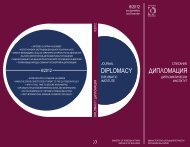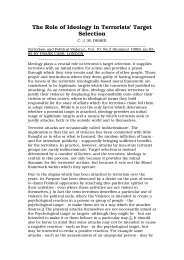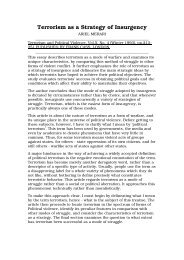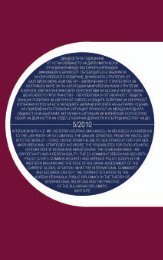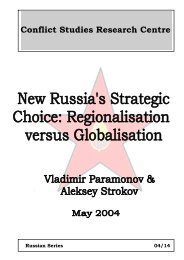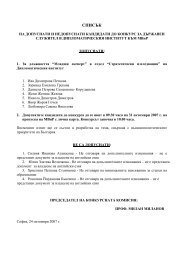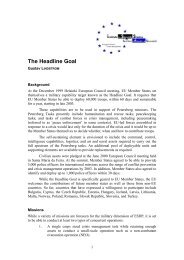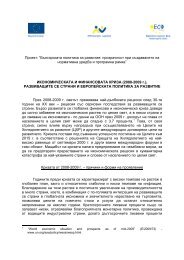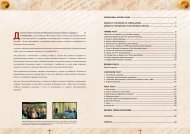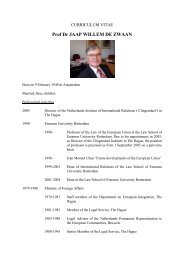The Myth of Ethnic Conflict: Chap 13 - Diplomatic Institute
The Myth of Ethnic Conflict: Chap 13 - Diplomatic Institute
The Myth of Ethnic Conflict: Chap 13 - Diplomatic Institute
You also want an ePaper? Increase the reach of your titles
YUMPU automatically turns print PDFs into web optimized ePapers that Google loves.
490 Maria Todorova<br />
Of the total population <strong>of</strong> the Yakoruda municipality <strong>of</strong> 12,000<br />
(all together 7 villages), only about 2,500 declared themselves to be<br />
Bulgarians, a symmetrical reversal <strong>of</strong> the results <strong>of</strong> two decades ago,<br />
when Muslims constituted about the same minority. 64 <strong>The</strong> rest declared<br />
themselves to be ethnic Turks. In this particular municipality<br />
the Muslims are Pomaks who have no practical knowledge <strong>of</strong> Turkish;<br />
therefore, their self-identification as Turks gave rise to bitter<br />
accusations <strong>of</strong> Turkification. For the same reason, the question <strong>of</strong> the<br />
optional study <strong>of</strong> Turkish in schools, which kindled a flaming discussion<br />
all over the country, was especially bitter in this region. Of<br />
the 1,721 students in the municipality, 1,174 were entered as Turks.<br />
As a reaction to that, many Bulgarian parents recorded their children<br />
under the age <strong>of</strong> 16 as Americans, Japanese, Germans, and even<br />
Eskimos, arguing that their children were parts <strong>of</strong> these ethnic<br />
groups as much as their Muslim counterparts were Turks. 65 <strong>The</strong><br />
“Japanese” and the “Eskimos” in particular indicated Chinese as<br />
their mother tongue. This 400-strong “Chinese”-speaking group<br />
pointed out that it would look for the defense <strong>of</strong> its human rights in<br />
the Chinese embassy in S<strong>of</strong>ia. 66<br />
That the Pomaks’ Muslim identity is rendered politically invisible<br />
by the language-based institutions <strong>of</strong> modern Bulgaria does not<br />
preclude the potential for other forces to politicize Pomak cultural<br />
identity. Cultural conflict reached a high degree <strong>of</strong> intensity by the<br />
middle <strong>of</strong> 1992, when local imams refused to bury the deceased who<br />
had not changed their names back to Muslim ones after 1989. 67 At<br />
the same time, this region was the object <strong>of</strong> active attention on the<br />
part <strong>of</strong> emissaries <strong>of</strong> the World Islamic League. A number <strong>of</strong> mosques<br />
have been built in the region with the financial support <strong>of</strong> the<br />
league. 68 <strong>The</strong> theory <strong>of</strong> the Turkish ethnic origins <strong>of</strong> the Pomaks, who<br />
had allegedly forgotten their language under the stressful events <strong>of</strong><br />
1912, has gained ground precisely in this region. This theory is espoused<br />
by the Movement <strong>of</strong> Rights and Freedoms, whose representatives<br />
are at present leaders <strong>of</strong> the municipality. 69 It has to be<br />
kept in mind that these are the regions where the forceful change <strong>of</strong><br />
names in the 1970s campaign was particularly gruesome, where the<br />
Rodina movement <strong>of</strong> the 1940s had no success, and where followers<br />
<strong>of</strong> the reconstituted, extremely nationalist Internal Macedonian<br />
Revolutionary Organization (IMRO) are especially active. 70



